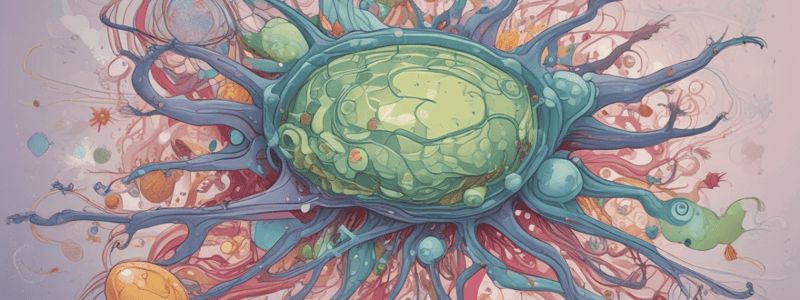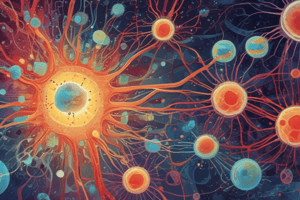Podcast
Questions and Answers
What is the primary function of the mitochondria in a cell?
What is the primary function of the mitochondria in a cell?
- Producing energy (correct)
- Modifying proteins
- Storing DNA
- Protein synthesis
What is the term for the movement of molecules from high to low concentration without energy expenditure?
What is the term for the movement of molecules from high to low concentration without energy expenditure?
- Active transport
- Passive transport (correct)
- Osmosis
- Diffusion and osmosis
Which organelle is responsible for protein synthesis?
Which organelle is responsible for protein synthesis?
- Endoplasmic reticulum
- Lysosomes
- Mitochondria
- Ribosomes (correct)
What is the term for the 'suicide' of a cell, resulting in its own death?
What is the term for the 'suicide' of a cell, resulting in its own death?
Which organelle is involved in the breakdown of fatty acids and amino acids?
Which organelle is involved in the breakdown of fatty acids and amino acids?
Flashcards are hidden until you start studying
Study Notes
Cell Biology
Cell Structure
- Plasma Membrane: semi-permeable membrane that separates cell from environment
- Cytoplasm: jelly-like substance inside cell where metabolic processes occur
- Nucleus: control center of cell where DNA is stored
- Mitochondria: energy-producing organelles
- Endoplasmic Reticulum (ER): network of membranous tubules and cisternae involved in protein synthesis and transport
- Ribosomes: site of protein synthesis
- Lysosomes: membrane-bound sacs containing digestive enzymes
- Golgi Apparatus: complex of flattened sacs and tubules involved in protein modification and secretion
Cellular Processes
- Metabolism: conversion of energy and nutrients into ATP
- Photosynthesis: process by which plants convert light energy into chemical energy
- Cell Signaling: communication between cells through signaling molecules
- Cell Division: process by which cells reproduce, including mitosis and meiosis
- Apoptosis: programmed cell death, or cellular suicide
Cellular Transport
- Passive Transport: movement of molecules from high to low concentration without energy expenditure
- Diffusion: random movement of molecules
- Osmosis: movement of water molecules through semi-permeable membrane
- Active Transport: movement of molecules against concentration gradient using energy
Cellular Organelles
- Centrioles: involved in formation of cilia, flagella, and spindle fibers
- Chloroplasts: organelles responsible for photosynthesis in plant cells
- Peroxisomes: involved in breakdown of fatty acids and amino acids
- Cytoskeleton: network of filaments providing structural support and shape to cell
Studying That Suits You
Use AI to generate personalized quizzes and flashcards to suit your learning preferences.




